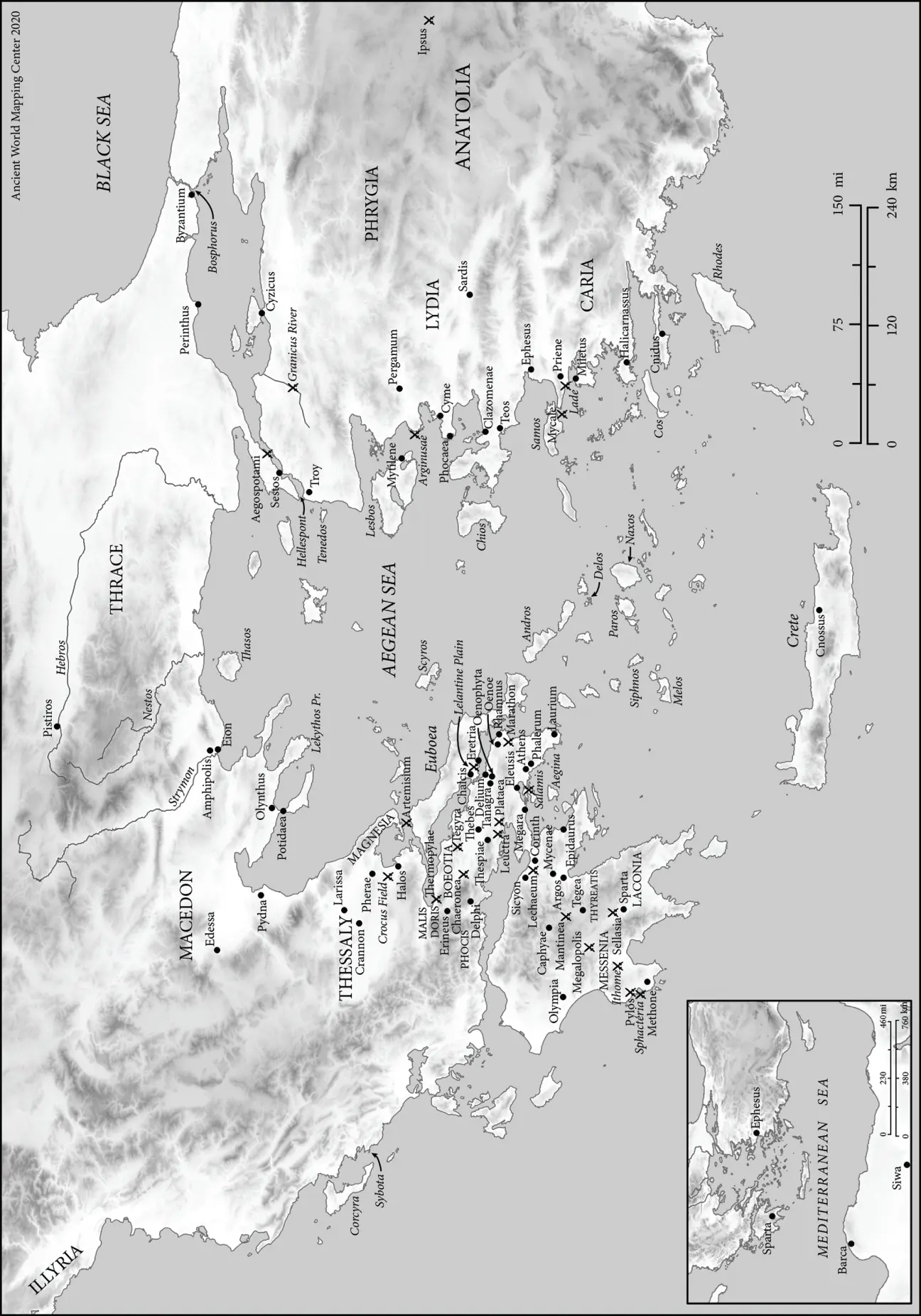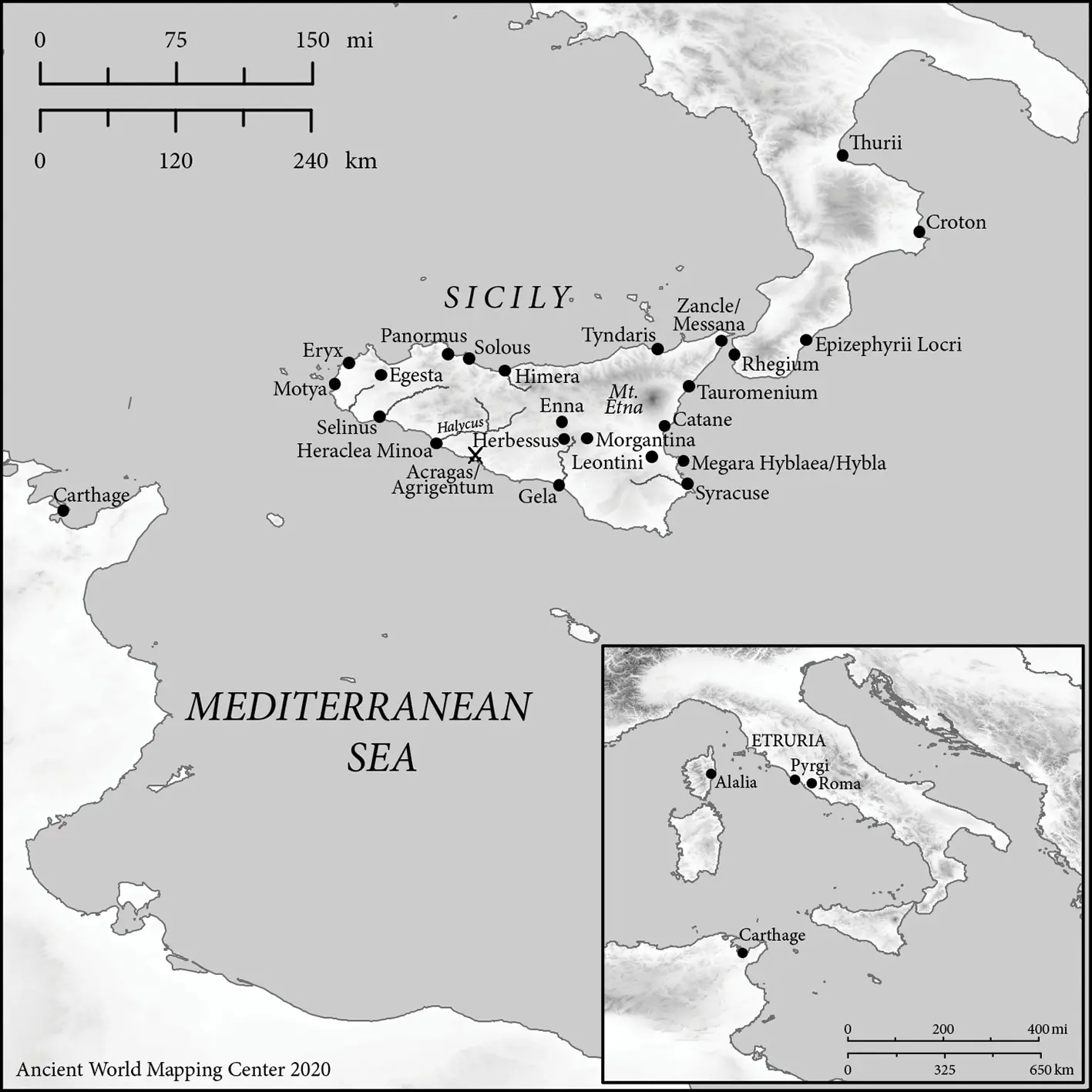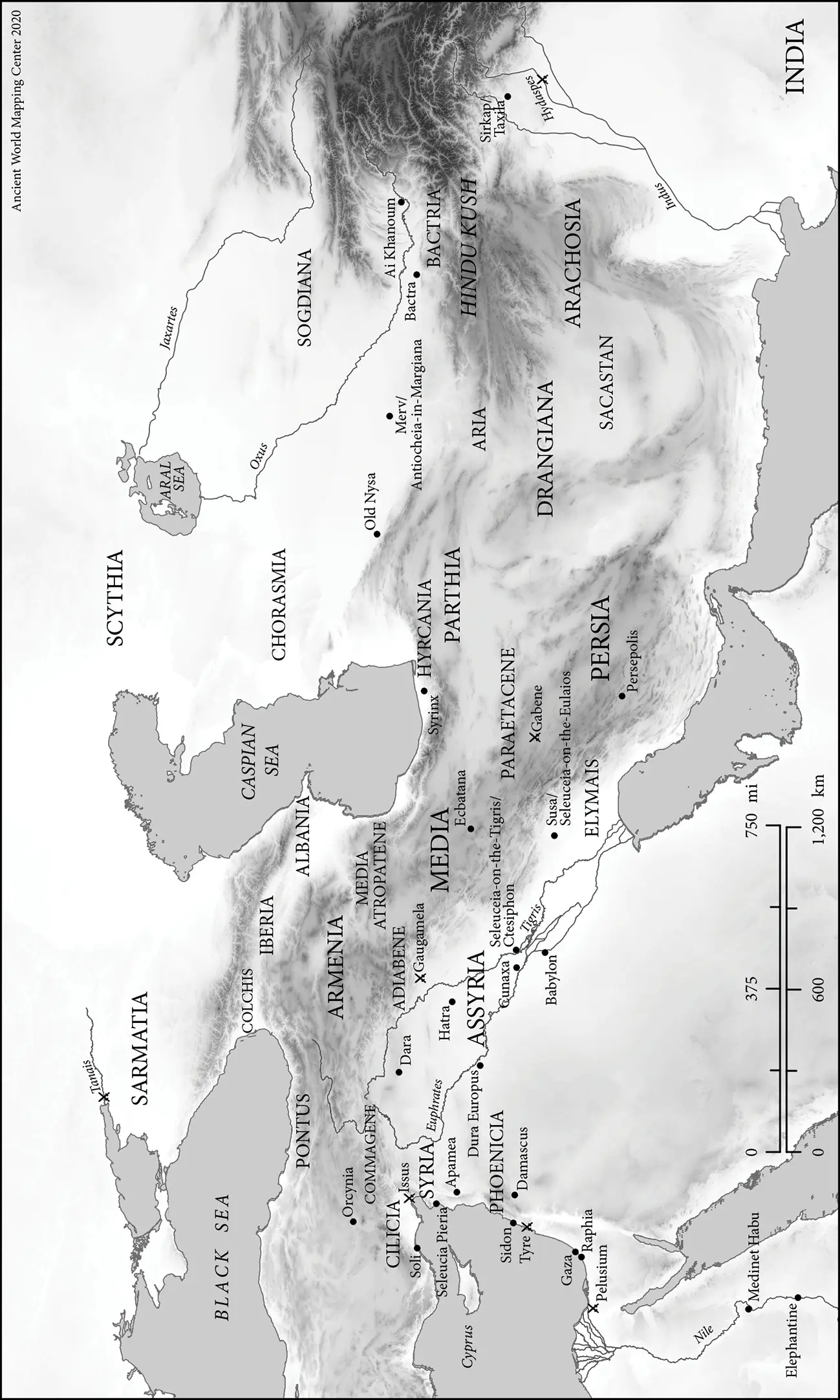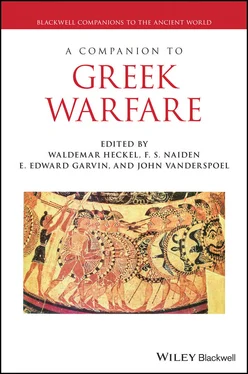
Map 1Greece and Anatolia.

Map 2Sicily and Magna Graecia.

Map 3The Hellenistic East.
Waldemar Heckel and F.S. Naiden
Although the study of ancient Greek military history has flourished in the last few decades, no handbook or survey exclusively about this subject has appeared. The Wiley Companion to Greek Warfare fills this intellectual and pedagogical gap. It considers how Greek states prepared themselves, materially, psychologically, and politically, for confrontations with their adversaries; how the techniques used to overcome the enemy on the battlefield—whether on land or sea—were honed through training, tactical innovation, and technological advances; how the logistical demands of maintaining an army on the march or in distant lands were met, and how their warfare was justified in the face of moral and religious prohibitions against murder and other types of violence.
Even though an army moved on its stomach, it was motivated to move by the heart, and directed by the mind. Propaganda was used for justification and condemnation; the noble and manly virtues of the good soldier contrasted with the alleged cowardice and effeminacy, or the inhumanity and brutality, of the enemy, who was on some occasions to be feared and on others to be despised. For Greek imperialists, degraded enemies were easily confected, and invented atrocities promulgated. For those who faced aggression, the defense of family, property, and shrines was sufficient motivation; but even then the accumulated warrior traditions of the past, such as those that inspired the Thebans in 335 (Diod. Sic. 17.11.5), were no less essential than mobilizing troops or digging trenches and strengthening walls.
Equally important were the skills of the general, scout, spy, mechanic, smith, diviner, architect, teamster, and horseman. These and other technai let the ancient Greeks invent or make better artillery, improve ship design, create some genres of military literature, advance the use of combined arms, and make strategy, previously a royal and aristocratic monopoly, a matter of public debate. In all these regards, the Greeks were learning from, and competing with, their Near Eastern and European neighbors from Thrace to Persia. Notions that Greek warfare was unique or seminal, or even that it was superior to the warfare of neighboring peoples, are all exaggerated, the truth being that the Greeks and the Macedonians were distinctive and influential, but superior only for a brief period, one not much longer than the period of German superiority in modern Europe, and much shorter than the period of Roman superiority that would begin in the third century BCE. 1The Romans came to regard the Greeks as unmilitary, if not effeminate. 2The Pharaohs who hired Greek mercenaries thought differently.
Waging war was not an isolated event (or even a series of events), but a process that touched upon virtually all aspects of Greek life. And, even though the Greeks did not worship Mars (Ares) as the Romans did—indeed Ares is depicted in a most unsympathetic way by Homer ( Il . 5.888–898)—war dominated much of their lives or at least hovered on the horizon. Alexander the Great was paradigmatic. From birth, he had been raised for war, as both a combatant and a tactician, a leader and a comrade—a soldier foremost in both the formulation and execution of orders. His first teachers imbued in him a passion for the aristeia of the Homeric hero and the strict discipline that had made Sparta the living guidebook of military virtue, and he went on to read not only the Iliad and the works of the Athenian tragedians but also Xenophon and, most likely, Herodotus. The written word and its interpretation by some of the Greek world’s greatest minds provided the underpinning of his warcraft, while the veteran generals of Macedon were there to advise, their actions clearly visible; for the prince had been thrust at an early age into the thick of battle.
Although arguably the greatest warrior of antiquity, Alexander was not unique. Every man’s fame, as the man from Seriphus reminded Themistocles, depended on the prestige of his homeland, and that, in turn, depended on public and especially military service. Even those leaders who were orators rather than generals celebrated military heroes, many of them ancestors, others ordinary citizens. What these men did, and how they acted in what must be one of life’s greatest trials, reflected the many arts (and the mundane demands) of war described in this volume, one that probes beyond the familiar if often dubious record found in the works of the historians and orators or in contemporary public documents.
Unlike two other recent books, The Cambridge History of Greek and Roman Warfare and The Oxford Handbook of Warfare in the Classical World , this volume does not subordinate Greece to Rome, or the entire length of Greek history to whatever part of it is “Classical.” So much is clear from the titles of these books, but this one also differs from the other two by covering more topics in a larger number of chapters. 3The editors have sought to include all major topics in the field of Greek and also Macedonian military history, including not just armies and their operations but also the economic, social, psychological, and cultural context of warfare. We have added neglected operational topics such as strategy and the role of Greeks in foreign service, and four chapters on the armies and methods of the Greeks’ and the Macedonians’ opponents, but we have also added new contextual topics such as religion, civil war, iconography, propaganda, and the roles of slaves and women. Basics such as generalship and siege warfare receive whole chapters. Compared to other works, this book has more to say about realia , less about discourse, and in the latter case, it pays more attention to propaganda and monuments and less to general features of Greek culture.
This book also draws on more diverse contributors, totaling 28 from 11 countries. The majority are not from the United States and the United Kingdom; 11 are not from English-speaking countries. Some are authorities who have written for other military handbooks; others are young scholars working from monographs in neglected fields; most are ancient historians, but some are specialists such as archaeologists, or historians of religion. All in all, these scholars have less investment in idées reçues concerning Greek hoplites, Greek models, and Greek distinctiveness.
These differences reflect a bigger one, concerning method. The chapters in this book center on some type of evidence, or some period that written sources establish as distinctive, or some locale that archaeological and artistic sources establish as distinctive. Approaches to this body of evidence vary; they may be biographical, operational, institutional, social, economic, or cultural. Operations do not always predominate, but always matter: why and how wars are won or lost, and made or avoided, is crucial for some topics, important for others, and relevant to all. The prelude and sequel to wars receives less attention; any homology between war and society receives less attention than differences between the two.
Читать дальше















